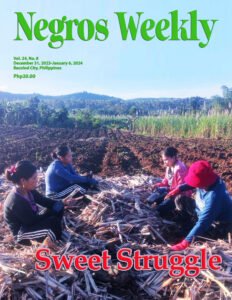• AC HIMAYA V. TUPAS
The writer is the assistant newspaper editor of The SPECTRUM, the official student publication of the University of St. La Salle.
In 2023, she was an awardee of the Nationwide Search for Ten Outstanding Young Journalists by the Ditto Sarmiento Journalism Cup. Her passions are anchored on writing, social justice, and climate action.
***

The effects of climate change are now felt in the vast sugarcane fields of Negros Occidental, the so-called “Sugar Bowl of the Philippines.”
Edwin Oñate, 56, a sugar and rice farmer from the Nakalang Farm Workers Association based in Bago City, shared that he and his fellow farm workers have witnessed the impacts of the rapidly-changing climate.
“We cannot predict the current climate anymore, nor can we navigate the conditions of the weather. When it is supposed to be a wet season, the heat persists. Or vice versa, when it is supposed to be a dry season, it rains. The impact to agriculture here in our farms is that we cannot harvest our crops regularly,” he said.
Oñate said the volatile climate has damaged their livelihood, which is their only source of income.
Sugarcane is the “lifeblood” Negros Occidental’s industry, as the province produces about 60 percent of the country’s overall sugar output. The province spans a total of 540,386 has. of agricultural land area, around 54 percent of which is sugar-based. It had 13 sugar mills and six refineries, the most in the country.

Climate’s impact to sugar
Climate change is likely to have an extensive impact on agriculture around the world through changes in temperature, precipitation, and CO2 concentration.
The Intergovernmental Panel on Climate Change’s Sixth Assessment Report released in 2022 noted that rising temperatures and changing weather patterns often result in lower crop yields due to water scarcity caused by drought, heat waves, and flooding.
“With regard to food security, [our] production turns into losses due to the abnormality of the climate. There is no assurance that we can salvage our crops. Even the support services of the government are not enough and sustainable,” according to NAFWA chairperson Dionesio Sanchez.
Association members said that strong typhoons and extreme weather conditions aggravated by climate change damage their crops, reduce yields, and lower their incomes.

In a 2019 book chapter authored by Pakistani researchers, they found that temperature stress is “a major environmental stress that limits the sugarcane growth, productivity and metabolism worldwide.”
In the Philippines, data from the Sugar Regulatory Administration at the end of Crop Year 2022-2023 showed that the volume of sugarcane milled, raw, and refined sugar production reached its lowest in the last five crop years since 2018-2019.
Dr. Eduardo Tadem of the University of the Philippines Los Baños’ Institute of Crop Science and Dr. Teodoro Mendoza of UP Diliman wrote in an April 2023 Philippine Daily Inquirer article that climate change has been a factor in decreasing sugar yields.
Super typhoons such as Odette which hit Visayas and Mindanao in December 2021 destroyed sugarcane fields and decreased sugar yield by more than 150,000 tons, they said.
The phenomenon and its subsequent effect on the sugar industry, they noted, did not exist in the 1970s, which resulted in more sugar importation.
They also warned that the coming crop year, the El Niño-induced drought would “again surface affecting cane growth, thus decreasing further sugar yield and increasing sugar imports.”
NAFWA Vice Chairperson Gina Barcibal shared:
“[Our farmers] have experienced getting their work doubled due to the effects of heavy rains. Just when you thought the heat was good in the morning, a deluge of rain takes over in the afternoon. The work doubles since you have to replace the destroyed crops again because the flood completely wipes out the seeds.”
The climate crisis has also adversely affected the farmers’ health and well-being, as some have experienced hot weather-related illnesses, like heat stroke, while working.
“Farmers around here, for example, already stop working in the fields by 10 in the morning because they cannot stand the heat anymore, especially those who are of old age. The heat these days is really different,” Sanchez stressed.
More government aid, environmental programs, and climate literacy
NAFWA farm workers wish that the government would actively implement more programs centered on addressing their common problems, like providing more farm equipment and mechanization and development of farm-to-market roads, among others.
For now, the Office of the Bago City Agriculturist is strengthening its City Agricultural and Fishery Council, where sectoral committees composed of different farmers associations tackle climate-related concerns.
The Bago OCA also has a Climate Smart Season-Long Farmers’ Field School which aims to enhance farmers’ knowledge and skills on climate-smart production technologies.
In addition, said Marvin John E. Blance, city agriculturist-designate, we promote organic agriculture as a way for farmers to adapt and mitigate the effects of climate change.
To reduce carbon footprint, the OCA also provides industrial crop planting materials, such as cacao, banana, and coffee seedlings to upland farmers for agroforestry, as well as conducts tree and mangrove planting in mountains and coastal barangays, Blance added.
Pushing for climate justice, NAFWA members said First World countries, like the United States, and international corporations largely responsible for global carbon emissions must be held accountable.
“These ‘super countries’ just [do whatever they want]. They are the ones accountable for the [increase] of greenhouse gasses but we [Filipinos] are the ones suffering. The problem must be addressed by them in the first place,” Sanchez said.
Farmers also believe that education is a pivotal tool in fighting climate change, which is why they emphasize the need for more educational initiatives centered on climate literacy.
“When it comes to global climate change, it is not only us, farmers, who experience this kind of crisis. It is our role to expand our organizing and share to people the things we have learned and the things that are happening [related to climate]. This is the duty of an association which is also to help the community,” Sanchez said. | Cover photo by Gina Barcibal
***
This story was supported by Climate Tracker Asia and the U.S. Embassy in Manila.




